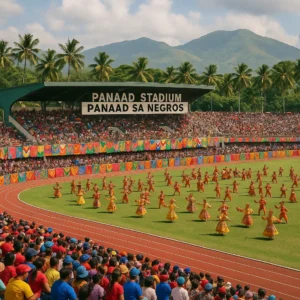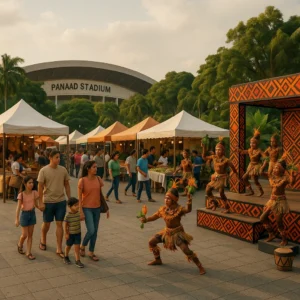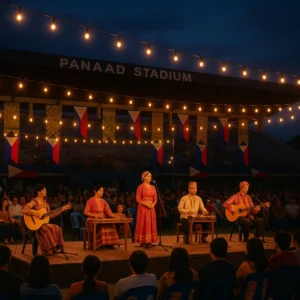In the heart of Bacolod City, Panaad Stadium is more than just a venue for football. It has become a cultural landmark, reflecting the passion, pride, and identity of the Filipino people, especially in Negros Occidental.
This stadium has hosted victories, festivals, and voices — all echoing the spirit of the Philippines.

Rooted in Regional Identity
Panaad means “promise” in Hiligaynon. The name itself reflects the deep connection between the stadium and the people of Western Visayas.
Cultural connections include:
-
Site of the Panaad sa Negros Festival, an annual celebration of all cities and municipalities in the province
-
A place where ethnic dances, traditional music, and regional cuisine come together
-
A proud symbol of Visayan heritage and provincial unity
It stands as a living showcase of Filipino culture and resilience.

Celebrating National and Local Achievements
Panaad Stadium has witnessed more than sports. It has been a stage for events that shaped local and national pride.
Key cultural roles it played:
-
Hosted the 2005 Southeast Asian Games football matches, helping place Bacolod on the international map
-
Served as the home for Ceres–Negros FC, making football part of local identity
-
Became a venue for school events, religious gatherings, and civic programs
It became a gathering space for all — athletes, artists, students, and families.

Strengthening Community and Belonging
The stadium has always been a community-first space. More than just concrete and seats, it reflects a shared sense of belonging.
Community value highlights:
-
Local vendors thrive during events, selling food, shirts, and souvenirs
-
People of all ages visit the complex for jogging, fitness, or relaxation
-
It is often a site for public outreach, health fairs, and disaster relief centers
This everyday relevance makes Panaad part of daily life in Bacolod and beyond.
A Beacon of Provincial and National Pride
Panaad has inspired many beyond the stadium walls. It helped decentralize sporting and cultural focus from Metro Manila and bring attention to regional excellence.
Its broader cultural impact:
-
Encouraged youth participation in sports, especially football
-
Became a symbol of unity among the 13 cities and 19 towns of Negros Occidental
-
Represented the Philippine passion for festivals, sport, and community
It’s not just a venue. It’s a cultural milestone for the Philippines.

Future of Cultural Relevance
Even as new stadiums rise, Panaad remains a cultural fixture. Renovations and events continue to keep it relevant and community-centered.
What lies ahead:
-
Plans for museum-style exhibits inside the stadium, showcasing its history
-
Continued support from the local government to preserve its heritage role
-
More cultural programming, including arts workshops, food fairs, and provincial showcases
Its future is tied to the Filipino identity it proudly represents.
Frequently Asked Questions (FAQs)
What does Panaad Stadium represent culturally?
It represents unity, heritage, and pride in the Philippines, especially for people from Bacolod and Western Visayas.
Is Panaad used only for sports?
No. It’s also used for festivals, concerts, civic events, and community gatherings.
Why is the stadium important to Bacolod?
It’s a landmark that reflects the city’s identity, hosting both local and national milestones.
What is the Panaad sa Negros Festival?
An annual festival held at the stadium, showcasing the culture, crafts, and traditions of all LGUs in Negros Occidental.
Can tourists visit Panaad Stadium?
Yes. It is open to the public and often included in city tours and festival routes.
A Cultural Icon That Lives On
Panaad Stadium is not just about what happens inside it — it’s about what it means to the people outside it.
From festive parades to emotional wins, from family outings to national celebrations — its legacy is deeply woven into Philippine culture.
It is, and will remain, a beacon of promise, proudly keeping its panaad to the people.
